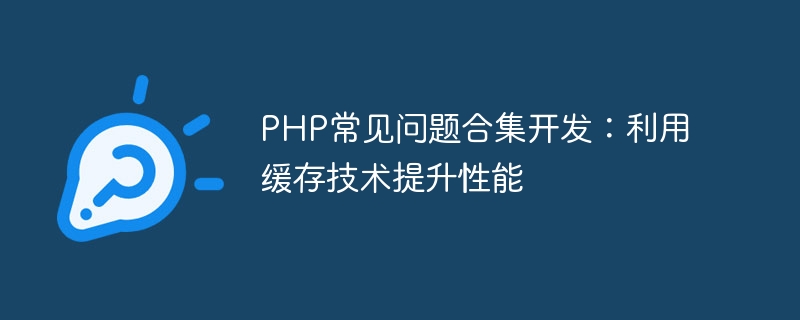

Collection of PHP FAQ Development: Using Caching Technology to Improve Performance
With the continuous development of Internet applications, PHP, as a popular server-side scripting language, is widely used Used in the development of various web applications. However, due to the characteristics of PHP and the performance limitations of the server, we often encounter some performance problems. In order to solve these problems, we can use caching technology to improve the performance of PHP applications.
Cache is a technology for storing data. It can store calculation results or database query results so that they can be read directly from the cache the next time they are used, without the need to perform calculations or query the database again. Below we will introduce some common caching technologies and their applications in PHP applications.
Page caching is one of the most common and simplest caching techniques. It can cache the content of the entire page in the form of HTML, and then directly output the cached content the next time you visit the same page without the need to generate the page again. In PHP, we can use some caching plug-ins or extensions to implement page caching, such as memcached, Redis, etc.
Data caching is to store data in memory to increase the speed of data reading. For example, when we need to obtain database query results, we can first check whether the corresponding results already exist in the data cache. If so, we directly obtain the data from the cache without querying the database again. Commonly used PHP data caching technologies include memcached, Redis, etc.
Fragment caching is to cache part of the content of the page to improve the loading speed of the page. For example, in a dynamically generated page, there may be some content that does not change frequently. We can cache this content and directly output the cached content the next time we visit the page without the need to generate it again. In PHP, we can use some caching plug-ins or extensions to implement fragment caching, such as smarty template engine, which supports fragment caching.
File caching is to store data in files to increase the speed of data reading and writing. In PHP, we can use file cache to store some frequently used data, such as configuration information, log records, etc. By storing this data in a file, we can avoid reading the database or recalculating every time it is accessed, thereby improving performance.
The cache invalidation policy refers to the circumstances under which cached data will be updated or regenerated. In PHP, we can develop corresponding cache invalidation strategies based on business needs. For example, when a certain data changes, we can update the cache in real time through triggers or events; or we can set an expiration time and regenerate the cache when the cached data expires.
To sum up, using caching technology can effectively improve the performance of PHP applications. Through technologies such as page caching, data caching, fragment caching, and file caching, we can reduce the pressure on the server and increase the speed of data reading and writing. At the same time, it is also very important to formulate a reasonable cache invalidation strategy to ensure that cached data can be updated in a timely manner. I hope this article can be helpful to everyone who encounters PHP performance problems during development.
The above is the detailed content of PHP FAQ Collection Development: Using Caching Technology to Improve Performance. For more information, please follow other related articles on the PHP Chinese website!
 What system is qad?
What system is qad?
 How to solve dns failure
How to solve dns failure
 How to deal with garbled Chinese characters in Linux
How to deal with garbled Chinese characters in Linux
 What does frame rate mean?
What does frame rate mean?
 The difference between access and trunk ports
The difference between access and trunk ports
 How to connect broadband to server
How to connect broadband to server
 How to open state file
How to open state file
 Can Douyin sparks be lit again if they have been off for more than three days?
Can Douyin sparks be lit again if they have been off for more than three days?




